Reflections from the Heyington to Highlands program
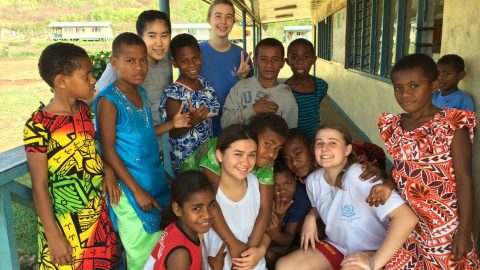
“The most significant thing I’ve learnt and experienced is definitely making new friendships, learning to open my eyes up, acknowledging that I don’t have to rely on technology because if I surround myself with the right group of people then life would be perfect. I learnt that we don’t need to live in luxury and natural resources can get you very far in life.” – Draiba group
Our Year 9 students have returned from the Heyington to Highlands service-learning program. This program provides our students with a wonderful learning experience in the Highlands of Fiji and with the Fijian people. The students have reflected on the warmth, trust, friendship and inclusion of the Fijian people. Having spent the first half of the program in the village of Nasivikoso and Kenani, I was fortunate to witness the hands-on experience of our students. The Fijian people have provided our girls with an experience that is not available as a holiday destination, it is truly unique and valuable to the students and staff that have experienced the program.
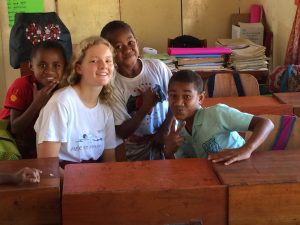 Eyler and Giles, (1999), describe service learning as “… a form of experiential education where learning occurs through a cycle of action and reflection as students work with others through a process of applying what they are learning to community problems, and at the same time, reflecting upon their experience as they seek to achieve real objectives for the community and deeper understanding for themselves”. In line with current research, the Heyington to Highlands program objectives are:
Eyler and Giles, (1999), describe service learning as “… a form of experiential education where learning occurs through a cycle of action and reflection as students work with others through a process of applying what they are learning to community problems, and at the same time, reflecting upon their experience as they seek to achieve real objectives for the community and deeper understanding for themselves”. In line with current research, the Heyington to Highlands program objectives are:
- Increased understanding of, and appreciation for different cultures, living conditions, languages and outlooks on life through immersion in a Fijian village.
- Increased ability to engage responsibly in community activity through immersion in a Fijian community, support of classroom based activities and engagement with St Catherine’s School.
- Increased understanding of the world beyond school and developing issues.
- Increased understanding of community-driven development and carrying models of aid being delivered in Fiji.
- Increased awareness of one’s rights and responsibilities as a global citizen.
- Increased interpersonal capacity, self awareness and critical thinking skills through challenging experiences in a remote environment.
- Increased ability to recognise when one is being challenged and persevere regardless.
- Contribution to another community through skill sharing, intercultural engagement and educational resources.
In the classroom, the Fijian students share one pencil between four students. They wait patiently until it is their turn to use the pencil to write in their books and complete the work that has been asked of them. St Catherine’s School provides each school with resources and sporting equipment to assist in the delivery of the Fiji curriculum. This year, the resources focused on early reading, with a significant number of readers for early and developing readers to assist in the development of their reading skills. 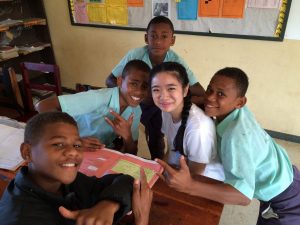
The girls in Nasivikoso played with the children and entertained themselves for hours by devising games with very few material items. The girls played with Freddie, a three year old boy from the village, throwing a ball up a small hill and catching it upon its return. The lip on the bottom of the hill provided enough height for Freddie to catch the ball on the way down from the hill. Freddie entertained himself for a long time with this simple activity. The girls were engaged in the regular occurrence of games played by the Fijian children in the playground and the village.
Furco, (1996), defines service learning as, “a method under which students learn and develop through active participation in … thoughtfully organised service experiences that meet actual community needs, that [are] integrated into the students’ academic curriculum or provide structured time for [reflection, and] that enhance what is taught in school by extending student learning beyond the classroom and into the community … ” (Corporation for National and Community Service, 1990).
When reflecting on the most significant change as a result of the Heyington to Highlands program, some of the student responses are below:
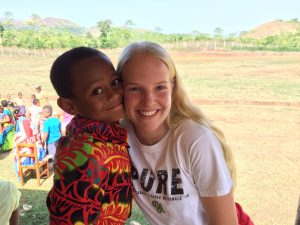 “One of the most significant changes that happened to me after my experience in Fiji is learning to appreciate myself not just on my physical appearance but also for who I am on the inside. This makes me feel a lot more confident about myself because of how non-judgemental the environment in Fiji has been. I also learnt that people aren’t who they seem on the outside and that I’m not the only one who is different. I think this has been the best experience and I am super thankful towards this program, especially Clint for making it as perfect as he possibly can for us.” – Nasivikoso group
“One of the most significant changes that happened to me after my experience in Fiji is learning to appreciate myself not just on my physical appearance but also for who I am on the inside. This makes me feel a lot more confident about myself because of how non-judgemental the environment in Fiji has been. I also learnt that people aren’t who they seem on the outside and that I’m not the only one who is different. I think this has been the best experience and I am super thankful towards this program, especially Clint for making it as perfect as he possibly can for us.” – Nasivikoso group
“To be more grateful and appreciative of everything you are given and always try and make people feel as welcomed as possible. Always live in the moment and that we should all learn to not rely on technology for entertainment as much because you will be a lot more happy otherwise.” – Nasivikoso group
“I think that I’ve come away from this trip having learnt many new things. Observing the culture in the Fijian Highlands has shown me a different outlook on how to deal with problems and how important family is. We should be aware of what other people do for us and give back to others to show appreciation. Having a positive outlook on problems is good because it allows you to think clearly.” – Nasivikoso group
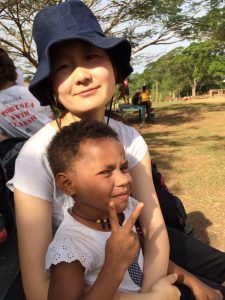 The Heyington to Highlands program provides our students with a personal learning journey through the educational and service learning objectives. Our partnership with Destination Dreaming and their experience and knowledge ‘on the ground’ in Fiji is extremely valuable. The program is well supported by teaching staff, nurses and old girls, who return to the program, having completed their own school journey over the past few years. The experience and knowledge of our staff assist our students in learning and growing through the experience. I thank the staff who have spent the time away from their families, to assist in ensuring the lives of our girls are further enriched by this experience.
The Heyington to Highlands program provides our students with a personal learning journey through the educational and service learning objectives. Our partnership with Destination Dreaming and their experience and knowledge ‘on the ground’ in Fiji is extremely valuable. The program is well supported by teaching staff, nurses and old girls, who return to the program, having completed their own school journey over the past few years. The experience and knowledge of our staff assist our students in learning and growing through the experience. I thank the staff who have spent the time away from their families, to assist in ensuring the lives of our girls are further enriched by this experience.
References
Furco, A. (1996). Service-learning: A balanced approach to experiential education.
https://serc.carleton.edu/introgeo/service/what.html


